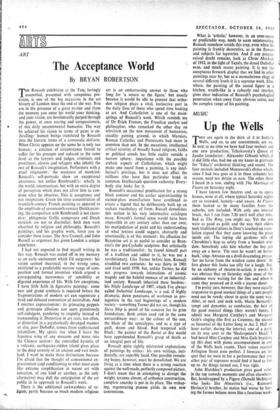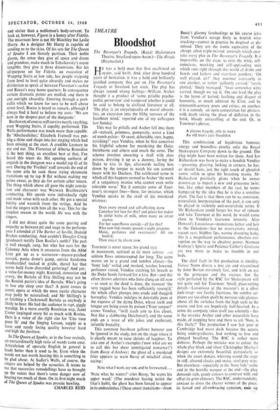Up the Wells
MUSIC I have known few theatres and, as to opera houses, none at all, where typical Saturday nights are so crowded, homely—and aware. At Figaro there looked to be many families from the suburbs, tots included. With only one interval break, Act I ran from 7.30 until well after nine. Bad as The Ring, you might say. Yet the tots were as good as gold; and the way their elders took traditional plums in Dent's touched-up trans- lation argued that they came knowing the piece inside out. The toping old gardener tells of Cherubino's leap to safety from a boudoir win- dow. Somebody asks him whether the boy got away on a horse. 'I'm sure he wasn't on horse- back,' sings Antonio on a droll descending phrase, `for no horse from the window came down.' At first glance this looks too silly for a laugh. But, by an alchemy of theatre-in-action, it works. It was obvious that on Saturday night most of the audience were waiting for the line and when it came they pounced on it with a joyous shout.
I'm pretty sure, however, that they were equally responsive to good musical things of a sort people need not be rowdy about in quite the same way. After, or neck and neck with, Mario Bernardi's tempi and dynamics as conductor, the best of the good musical things (they weren't funny, I admit) was Margaret Curphey's and Margaret Gale's singing (the first as Countess, the second as Susanna) of the Letter Song in Act 2. Half an hour earlier, during the interval, one of a party on its way over to the `Shakespeare's Head,' I had heard Miss Curphey and Miss Gale brushing up this duet with piano accompaniment in one of the Wells back rooms. Their voices reached Arlington Street note perfect. I forecast ,on the spot that we were in for a performance that any other pair of sopranos would find it hard• to live up to. As things turned out, I was right John Blatchley's production gives good value in the top comedy moments and often elsewhere. But, handicapped by a Figaro (Donald McIntyre) who looks like Almaviva's (i.e., Raimund Herincx's) brother, he makes bad worse by hav- ing the former behave more like a facetious week- end visitor than a nobleman's body-servant. To look at, however, Figaro is a honey after Fidelio.
The miscreant here is not Mr Blatchley but Leslie Hurry. As a designer Mr Hurry is capable of sending us to the skies. Of his sets for The Queen of Spades I am fiercely partisan. Their noble gloom, the sense they give of space and doom and grandeur, make much in Tchaikovsky's music tangible; they give it three dimensions. But his all-purpose set for Fidelio, an evocation of Wapping Stairs at low tide, has people traipsing from level to level quite absurdly and makes no distinction to speak of between Florestan's cachot and Rocco's cosy home quarters. In consequence
certain dramatic points are muffed, and there is one outright absurdity. Entering through a port- cullis which we know for sure to be well above street level, Rocco is heard to remark, although I always find it hard to believe my ears: 'We are now in the deepest part of the dungeons.'
Beethoven,of course, will survive nearly anything, even Wapping Stairs, if capably performed. The Wells performance was much more than capable. By 'Abscheulicher,' Elizabeth Fretwell was put- ting a shine and shape into her singing which had been missing at the start. A credible Leonore to eye and ear. The Florestan of Alberto Remedios is the best thing, an excellent best at that, I've heard this tenor do. His opening outburst of .anguish in the dungeon was a model top G of its sort. During the 'Freiheit' stuff towards the end of the same aria he took those trying chromatic transitions up to top B flat without making my palms sweat, as they do for certain other tenors. The thing which above all gave the night convic- tion and character was Warwick Braithwaite's conducting. His speeds were individually right and made sense with each other. He got a special fidelity and warmth from the strings. And he had the singers with him all the way. This for the simplest reason in the world. He was with the singers.
I did not detect quite the same gearing and empathy as between pit and stage in the perform- ance I attended of The Barber of Seville, Donald Brydon conducting. And couldn't Douglas Craig (producer) rectify Don Basilio's outfit? The part is well enough, sung, but who has ears for the Calumny Aria when it emanates from the Abbe Liszt got up as a scarecrow—mauve-patched cassock, panto dame's gamp, outsize bandanna handkerchief tucked in girdle, shovel hat that seems built from discarded guttering? And yet: a value-for-money night. Knotted, stentorian and crusty, the Bartolo of Eric Shilling may not be the Rossini purist's idea of Bartolo. Who's going to lose any sleep over that? A point comes in comic opera at which the most exotic character may justly be naturalised; and Mr Shilling's is as fetching a Clerkenwell Bartolo as anybody is likely to hear. He had the audience in rapt, giggly worship. In a more overtly Rossinian way, Janet Coster impinged every bit as much with Rosina. Hers is a voice of the right size for 'Una voce poco fa' and the Singing Lesson, supple as a lasso and rarely losing quality however hard and high the fioriture.
In The Queen of Spades, as in the four revivals, an extraordinarily high ratio of words came over. Articulation of operatic English in general is loads better than it used to be. Even when the words are not worth hearing this is something to be glad about. At Sadler's Wells, of course, the singers are helped by the acoustics. It seems to me that successive remodellings have so brought up the voices that there's some danger now of hearing too much of them. On its first night much of The Queen of Spades was prosaic bawling.
CHARLES REID







































 Previous page
Previous page